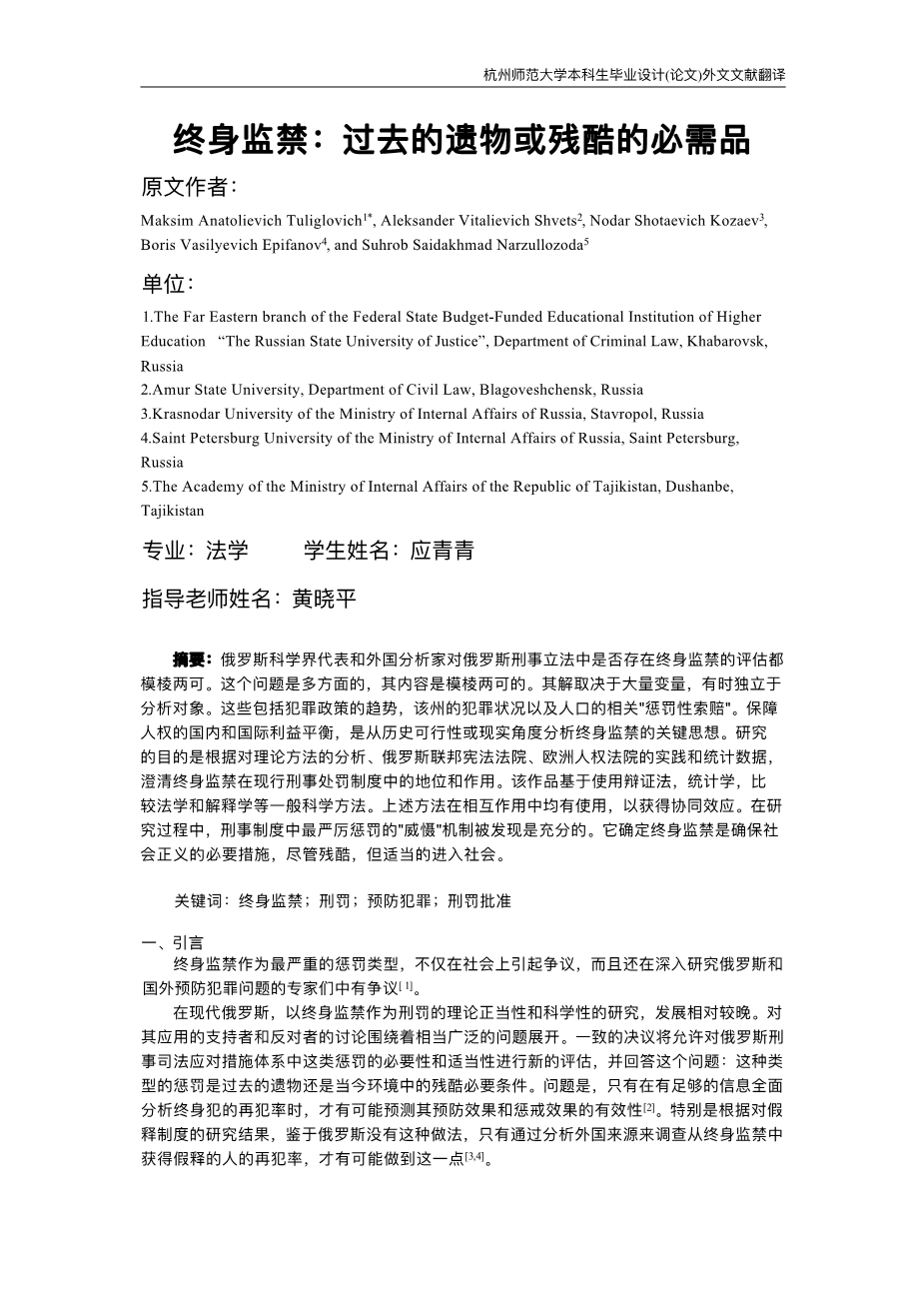

英语原文共 3 页,剩余内容已隐藏,支付完成后下载完整资料
SHS Web of Conferences 108, 02020 (2021) https://doi.org/10.1051/shsconf/202110802020
IX Baltic Legal Forum 2020
Life imprisonment: a relic of the past or dira recessitas
Maksim Anatolievich Tuliglovich1*, Aleksander Vitalievich Shvets2, Nodar Shotaevich Kozaev3 , Boris Vasilyevich Epifanov4, and Suhrob Saidakhmad Narzullozoda5
1The Far Eastern branch of the Federal State Budget-Funded Educational Institution of Higher Education “The Russian State University of Justice”, Department of Criminal Law, Khabarovsk, Russia
2Amur State University, Department of Civil Law, Blagoveshchensk, Russia
3Krasnodar University of the Ministry of Internal Affairs of Russia, Stavropol, Russia
4Saint Petersburg University of the Ministry of Internal Affairs of Russia, Saint Petersburg, Russia
5The Academy of the Ministry of Internal Affairs of the Republic of Tajikistan, Dushanbe, Tajikistan
Abstract. The existence of life imprisonment in the criminal legislation of
Russia is assessed ambiguously both by representatives of Russian science
and by foreign analysts. This problem is many-sided and ambiguous in its
content. Its solution depends on a large number of variables, sometimes
independent of the subject of analysis. These include trends in criminal
policy, the state of crime in the state, and the related “punitive claims” of the
population. The balance of Domestic and International Interests in ensuring
Human Rights is the key idea in analyzing life imprisonment from the
perspective of historical viability or reality. The purpose of the research was
to clarify the place and role of life imprisonment in the current system of
criminal punishment based on the analysis of doctrinal approaches, the
practice of the Constitutional Court of the Russian Federation, the European
Court of Human Rights, and statistical data. The work is based on the use of
such general scientific methods of research as dialectical, statistical,
comparative-legal and hermeneutic. The above methods are used in
interaction to obtain a synergistic effect. In the course of the study, the
“deterrent” mechanism ofthe most severe punishment in the criminal system
was found to be sufficient. It is determined that life imprisonment is a
necessary measure to ensure social justice, albeit cruel, but appropriate in
todayrsquo;s society.
Keywords: life imprisonment, punishment, prevention of crimes, penal
sanctions
1 Introduction
Life imprisonment, as the most severe type of punishment, has given rise and continues to give rise to controversial opinions and judgments not only by society, but also by experts who are deeply immersed in the study of crime prevention problems in Russia and abroad [1].
*Corresponding author: tu-m-an@yandex.ru
copy; The Authors, published by EDP Sciences. This is an open access article distributed under the terms of the Creative Commons Attribution License 4.0 (http://creativecommons.org/licenses/by/4.0/).
SHS Web of Conferences 108, 02020 (2021) https://doi.org/10.1051/shsconf/202110802020
IX Baltic Legal Forum 2020
Theoretical justification and serious scientific development of punishment in the form of life imprisonment in modern Russia began relatively recently, in view of the insignificant period of its application. Discussions of proponents and opponents of its application revolve around a fairly wide range of issues. The consistent resolution of which will allow a new assessment of the necessity and appropriateness of this type of punishment in the system of measures of criminal justice response to crime in Russia and to answer the question: whether this type of punishment is a relic of the past or a brutal necessity in todayrsquo;s environment. The problem is that the answer to most of them, such as predicting the effectiveness of its preventive impact and correctional effect [2] is possible only after a long time, when there is enough information for a comprehensive analysis of the recidivism rate of life-time prisoners. In particular, according to the results of the study of the institution of parole from serving the sentence. Given the absence of such practice in Russia, it is possible to do so only by analyzing foreign sources that examine the recidivism rate ofpersons released on parole from life imprisonment [3, 4].
2 Results
Analysis of statistical data shows that the number of persons sentenced to life imprisonment annually in the Russian Federation fluctuates on average from 64 to 70. The majority of those sentenced to life imprisonment are those who have committed qualified murders (part 2, article 105 of the Russian Criminal Code) (see diagram below) 1). In contrast to certain foreign countries, such as Ireland, where the dramatic increase in the number of life sentences is influenced by the mandatory nature of life imprisonment for murder [5], the availability of alternative sanctions in Russia provides a sufficient level of individualization of punishment.
We can observe the absence of both positive and negative dynamics, except for sharp jumps in 2003 (93 people), in 2004 (89 people
剩余内容已隐藏,支付完成后下载完整资料
资料编号:[596698],资料为PDF文档或Word文档,PDF文档可免费转换为Word


